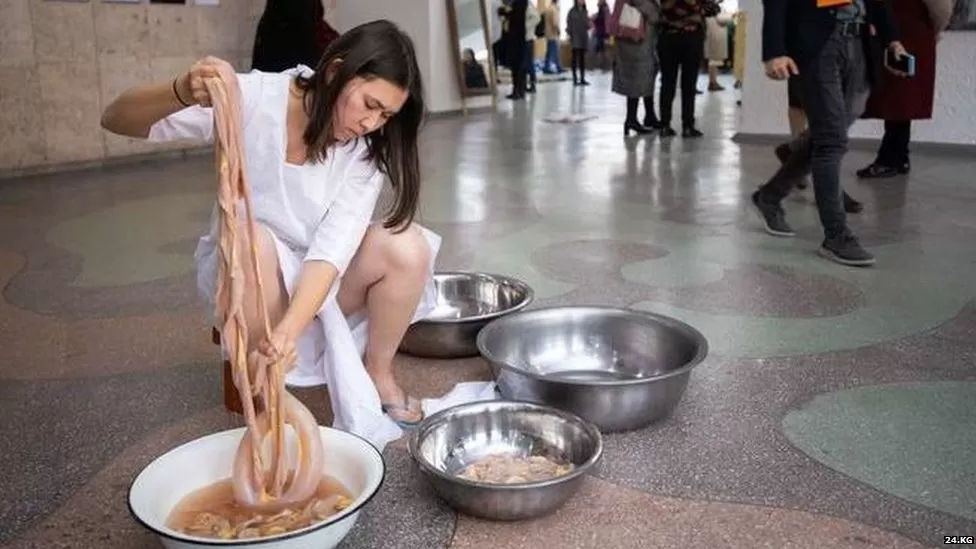A feminist art exhibition involving naked women in the Kyrgyz capital Bishkek has ignited a public row that’s cost the director of the venue her job.
The culture ministry condemned the event for using the “language of provocation” and for “disorientating visitors”, according to Kyrgyz news agency 24.kg.
The Minister of Culture, Azamat Jamankulov, said a special commission would examine the “scandalous exhibition”, which he described as a “campaign with naked women under the flag of feminism”.
Mr Jamankulov said the director of the venue – the National Museum of Fine Arts – had been relieved from duty over the event.
But Mira Dzhangaracheva shared “the truth” about her departure on Facebook. She quit voluntarily, she wrote, following the “aggressive reaction from the national patriotic forces” and after receiving threats to her and other museum staff.
“It is a pity this has been initiated by people who have never been to a museum,” she wrote.
‘Unconventional fight’
Speaking to journalists following her resignation, Mira Dzhangaracheva explained that the exhibition was timed to coincide with an annual international campaign against gender-based violence “to show what is happening in our country today“.
The exhibition, which involves work by 56 artists from 22 countries, is scheduled to run for 17 days. Organisers dedicated it to 17 women who died in a warehouse fire in Moscow in 2016 – most of them Kyrgyz migrants.
Organisers say the event seeks to show the social ills that stand in the way of gender equality and life without violence.
“This is violence against women. This is pain. This is fear. Artists from all over the world express their feelings, but we are forbidden,” said organiser Altyn Kapalova. “As always they try to shut us up but it won’t work. Art is uncensored.”
Visitors to the exhibition were confronted with a female body presented as a punchbag and exhibits allowing them to repeat chores that form a daily part of life for Kyrgyz women in the countryside, where thousands of young women are kidnapped for marriage every year.
But it was the nude performance by Danish artist Julie Savery, which intended to highlight the plight of sex workers, that caused particular offence among defenders of traditional values in the majority Muslim country.
‘Propaganda of pornography’
MP Makhabat Mavlyanova declared on Facebook that museum staff who allowed this event to take place “have no moral right to work”.
“Our Kyrgyz women should get traditional education“, she wrote. “Kyrgyz people have lost their ethnic identity over the past 30 years, using globalisation as a justification for these kinds of events.”
Others, like activist Aybek Busurmankulov, called for the prevention of such events in future.
“They have slogans about gay marriage at the exhibition. We believe that these slogans are anti-constitutional. We should check whether minors entered the museum when a naked woman was giving a performance. If minors entered the building then it will be considered as propaganda of pornography,” Mr Busurmankulov said.
One woman asked on Facebook: “What have women’s rights got to do with getting naked in an exhibition hall?“
“It’s about the stigmatisation of sex workers,” another woman replied. “They are not seen as people, as members of society, but merely as objects to satisfy physiological needs.”
MP Elvira Surabaldieva offered her support: “To all of you, dear gender experts, a big thank you for your long-standing struggle for the rights of women in Kyrgyzstan.”
In a blunt address to current leaders, former Kyrgyz president Rosa Otunbaeva condemned Mira Dzhangaracheva’s dismissal.
“Stop, gentlemen!” she said. “You may have administrative power, but there is also a public voice and female solidarity: the exhibition is dedicated to the fight against violence against women. What have you done to solve this problem?”
Source: BBC


